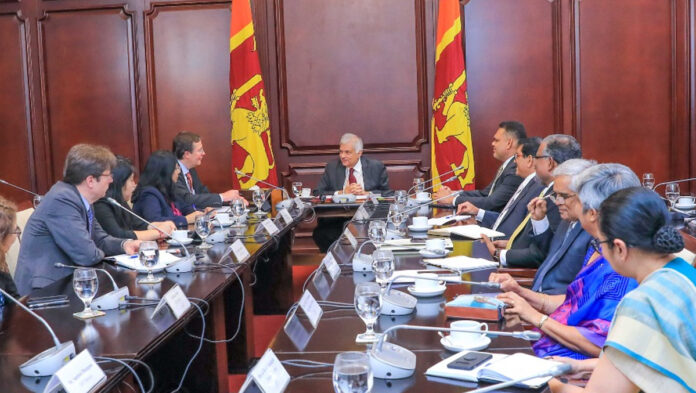[ad_1]
ECONOMYNEXT – Sri Lanka’s International Monetary Fund program could slow down in the second half of 2024 after the current review is completed, as elections make it more difficult to maintain the pace of reforms, government sources said.
An IMF mission is in SriLanka for the second review of a bailout that has pushed up taxes, and stabilized the external sector which was shattered by 2020 rate cuts.
President Ranil Wickremesinghe’s popularity has declined amid electricity price hikes while middle class wage earners were hit by high progressive taxes on a low base, on top of cascading social security levy and a required needed value added tax.
Wickremesinghe is considering to contest under a grand coalition in the presidential poll which has to be held in one month from September 18 this year, his allies have told EconomyNext.
The ruling Sri Lanka Podujana Party (SLPP), on whose votes Wickremesinghe is dependend for survival and passing IMF reform linked legislations, favours a general election first, according to political sources.
President Wickremesinghe administration has already cut electricity prices in March, saying monetary stability helped improve the finances of the state-run Ceylon Electricity Board as an appreciating currency reduced the import costs of coal.
“There could be some downward revision in tax,” a source who is close to President Wickremesinghe told Economy Next.
“Already the government has announced reduction in the electricity tariff.
“But we may not deviate much from the IMF targets. However, there could be delays in passing some required bills for economic reforms committed to the IMF.”
The IMF is keen to increase tax collections to maintain Sri Lanka’s bloated state sector without cutting spending, but reducing the income tax burden by widening tax brackets and raising the threshold to account for inflation (known as bracket creep) is a possibility, analysts say.
Rising private sector wages would in any case increase the PAYE taxes from the formal sector.
Another source said President Wickremesinghe is likely to discuss the possibility of a delay of the program with the IMF after the current review is completed.
The current review is targeted to be completed in April after the program was re-phased from the original deadline of March, with the September review pushed to October, though the original 48-month period was to be maintained.
The program requires ‘progress’ to be made particularly among private creditors. The government has said it plans to complete debt re-structuring by June.
The last review, scheduled for September ultimately went to the IMF board in December after the completion of some prior actions and progress made in debt restructuring was shown.
More legislative reforms needed to be completed ahead of the October review amid campaigning.
“The way things are going, we don’t see the current government can pass all the legislations it has promised as per schedule,” a source at an international lending agency who is aware of the government’s discussions with the IMF, said.
“The IMF has been largely satisfied with the government’s actions on the reform agenda.”
If the reforms are delayed, the October review could get pushed back the source said, with a substantial delay may require the completion date also to be extended.
Central Bank Governor Nandalal Weerasinghe told EconomyNext that there were no plans to delay the IMF program.
The government of Wickremesinghe, who was elected as the president by the parliament after his predecessor fled the country in the face of mass protests over his wrong economic policies, has got approval in the parliament for the IMF loan.
Most opposition legislators voted against the proposed IMF deal.
Sri Lanka sought the IMF deal after an unprecedented economic crisis after rates cuts on top of tax cuts, triggered forex shortages and an external default.
The main opposition Samagi Jana Balawegaya (SJB) and Marxists Janatha Vimukthi Peremuna-led National People’s Power have already said they would renegotiate the current IMF programme.
An NPP spokesman said after a meeting the IMF review team on Thursday that they opposed asset sales.
Large losses in state enterprises have shocked the public and made the general public more aware of the danger of government doing business with their tax money, though some politicians favour the control of state enterprises and bailing them out with public taxes.
Neither President Wickremesinghe nor the island nation’s Election Commission has declared any poll yet, either general or presidential.
The President’s office has said *the Presidential Election will be conducted within the mandated period, as per official notice”, while Commissioner General of Elections, Saman Sri Ratnayake earlier this month said the “Constitution stipulates that the next (presidential) election should be held between 18 September and 18 October.” Colombo/March 11/2024)
[ad_2]
Source link


